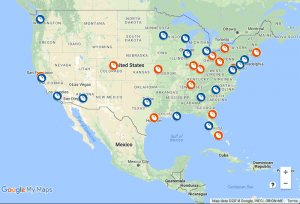A model good neighbourly agreement is provided as a starting point for such neighbourhood discussions. If you would like to work on the agreement or volunteer, please email Mikindra Morin, GNA Manager, mikindra@northernplains.org or call (406) 248-1154. A good neighborly agreement is usually a non-binding agreement between a neighborhood (community) and an industry that strives to solve specific problems collaboratively. It is a way for each group to understand each other`s mission and point of view, and leads to some form of compromise that can benefit both groups. This approach encourages voluntary action instead of the longer legal challenges that might otherwise arise. It is often best to try it out during a licence renewal or other change in the facility where the company is seeking community approval for its operations. HLC members have created a brochure that you can view and share with your employees. This booklet contains a list of local resources and tips on how to treat our uninhabited neighbours with compassion. We know that some interactions don`t always go the way we want them to and that police intervention is often not the best choice for a social issue like homelessness.
We hope these tips can help you and your staff interact with people who visit your neighborhood in a way that respects their unique situation. The HLC also has access to training that can also support you and your employees. Feel free to send an email info@cohomeless.org inquire. Results vary from group to group and community to community. In general, a fundamental outcome would be to hold at least one meeting where neighborhood and industry stakeholders are present to discuss important issues in the community. Some companies will be willing to work with a community outside the framework of a formal agreement, and this may also be a desired outcome. Since good neighbourly agreements are voluntary, important objectives can be achieved if a company agrees to address the concerns of the community without an agreement. Local examples of agreements to reduce air emissions, exchange public tenders and provide information on employment opportunities with the local community. For more information, visit the Minnesota Sustainable Communities Network (nextstep.state.mn.us) website. Northern Plains has a tradition of looking beyond our fences, keeping an open mind and finding creative solutions to protect our communities. Find out what “Our Story Tells Us” about working and negotiating a 20-year agreement with Sibanye-Stillwater Mining to enforce water quality standards that have stood the test of time: As a community member or company, an GNA is a tool to have a conversation about concerns and expectations, then agree on the problems that arise.
This is a neighbourhood approach to solving problems, but not a binding legal document. Good Neighbor Agreement As central Oregon meets the needs of our uninhabited neighbors, new facilities are being put in place to offer a variety of services and accommodations. It`s common for neighbors to have concerns when a new business, service, or other development enters a neighborhood. The Homeless Leadership Coalition suggests that neighborhoods use a good neighbor agreement to have the most positive and transparent conversation about neighborhood concerns. A well-executed good neighbourly agreement sets a vision and goals for how neighbours, including residents, businesses and service providers, work together to support each other`s success, communicate and address concerns. A community must have an organized group of volunteers and/or staff who can meet regularly to define specific outcomes and issues with the facility or facilities of interest. This group could be an environment committee or a neighbourhood committee, to name just two examples. It is usually best to have at least one person to gather preliminary industry information from public documents and data searches. The more targeted the result, the more limited the search should be.
A community will be in a better position to negotiate if they have a good understanding of what the company is doing, and their concerns will be taken more seriously once they have done some research. The best source of information is the industry itself: maybe the group can arrange a visit, or the company can send a representative to meet with the group. Direct contacts like these are desirable and can save the group many hours of research, provided the company is willing to share information. We managed to get information in this way. Information on the release and storage of chemicals is available online (see resource box) and is relatively easy to access. It may also be helpful to review all the municipal, state, and federal permits the company holds. Most of them require an appointment with the regulator, but some items can be sent directly to the applicant. Good Neighbourly Agreements (GIAs) are unofficial documents that describe a set of policies between a company and another party – neighbours, neighbourhood associations, trade associations or other businesses. THE PNOs are not legal documents of the City of Portland and are not enforceable by employees of the City of Portland.
If a nearby business or facility in a community is relevant due to noise, pollution, or other environmental complaints, neighborhood residents may decide to contact the company to address these concerns. The establishment of dialogues leading to a good-neighbourly agreement is an approach to solving these problems. It can also vary from group to group; Some agreements can be reached with minimal discussion and concluded within a few months, while others can take years to even take gradual action. The group will be more successful if it continues to advocate for a positive outcome and if its members have the time to dedicate themselves to this project each month. Over the past 20 years, the GNA has a proven track record of protecting our rivers and rural communities. But we can`t stop now. Not only are mines growing, but we can also set an example of what is possible when ordinary people come together and get creative. For years, members of Northern Plains fought against the Stillwater Mining Company to protect water quality and communities in Stillwater and Sweet Grass counties. In 2000, spurred on by the actions of members of the Northern Plains, the two sides worked together and negotiated an agreement to extend protection beyond state requirements to protect property, water and territorial communities while allowing the mining of platinum and palladium. The legally binding contract provided for a process in which citizens can meet regularly with company representatives to discuss and prevent issues related to mining impacts, cropping, wildlife and other issues. The Good Neighbourly Agreement protected land with conservation easements, introduced a bus program to responsibly manage traffic on the valley`s winding roads, and conducted independent environmental assessments. .
Bend Business Brochure Bend Business Brochure to print “If we have a mine, it will be the best mine in the world.” – Paul Hawks, former president of Northern Plains After 20 years under the Good Neighbourliness Agreement, members are still working and negotiating with the Stillwater Mining Company to develop new strategies to reduce a mine`s long-term impact on water quality and rural communities. Today`s most important efforts include groundwater monitoring, constant surface water sampling and biological health, as well as the use and development of new technologies. Click here to read the Good Neighbourly Agreement. Minnesota Pollution Control Agency, Good Neighbor Agreements www.nextstep.state.mn.us/res_detail.cfm?id=629 We envision maintaining a clean and healthy environment where the potential negative effects of mining are minimized and our communities continue to thrive. Good Neighborhood Agreement between Ritrama Inc. and the Southeast Como Improvement Association, prospect Park East River Road Improvement Association, Mississippi Corridor Neighborhood Coalition and St. Anthony Park Community Council. Contact: Justin Eibenholzl, 612-676-1731, Email: envirocoordinator@secomo.org – MN Emergency Planning and Community Right-to-Know Program We are local volunteers working together to protect our lands, water and communities.
.


